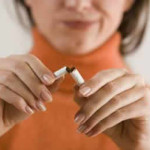How to Naturally Prevent Lung Cancer after Quitting?
Not all lung cancers are preventable, but most of them could be prevented. Because typically they are linked to cigarette smoking or less often due to exposure to radon and other environmental factors! Stopping smoking can be so helpful to reduce the risk. What else other things you need to do to naturally prevent lung cancer after quitting?
 Since your lungs play a key role in your respiratory system, there are many environmental conditions that can affect them and some may also increase your risk of lung cancer.
Since your lungs play a key role in your respiratory system, there are many environmental conditions that can affect them and some may also increase your risk of lung cancer.
Radon gas
Radon is a natural radioactive gas. It can be produced from the breakdown of uranium in the soil and rocks. It goes up through the ground, leaking into water supply or air. It can also accumulate inside homes and buildings.
The level of radon gas can vary. Unfortunately it is tasteless (odorless) and cannot be seen. But there is tool kit you can purchase to measure radon gas level in your home.
According to EPA (the US, environmental protection agency), about 20, 000 cases of lung cancer every year are linked to exposure to radon gas. This means it may be the second leading cause of the disease after cigarette smoking.
If you live in high area of radon gas, stopping smoking is even more important. The risk of lung cancer is greater in smokers exposed to radon than other people that also exposed to radon (but nonsmoker).
Exposure to other harmful substances /chemicals
Certain substances are thought to have a role in increasing the risk. The level of exposure and how long you get exposed to them are two important variables. As the level of exposure increases, your risk of lung cancer increases, too.
These carcinogen substances include: cadmium, nickel, arsenic, asbestos, beryllium, chromium, diesel fumes, tar and soot.
And some of them can be found in tobacco smoke. The risk is even higher if you also have other risk factors of lung cancer.
Exposure to asbestos was common in 1960s, especially in the construction industries. Today, it is much lower. However, asbestos is still a common cause since lung cancer linked to asbestos can take so long to develop.
Exposure to diesel fumes is quite common in professional drivers and miners. Silica is the main ingredient in glass making. If you work in one of these workplaces, it’s so important to take precautions to protect yourself from these carcinogens.
How about air pollution? It is dependent on where you live. If air pollution in your area is bad, it also can be another contributing factor to cause lung cancer. But in general, the risk from air pollution is much smaller than cigarette smoking.
Secondhand smoke is also dangerous. It still can contribute to increase your risk of lung cancer and even other health conditions. That’s why if you have been successful to stop smoking, secondhand smoke is another priority you need to avoid after quitting!
The following lifestyle measures may help, too.
Diet
Some studies have shown that diet high in fruits and veggies may help reduce the risk of some cancers, including lung cancer. It’s thought that certain essential nutrients in the fruits and veggies can help protect the body against carcinogens and free radicals, preventing cell damage.
Several years ago, vitamins of A, C, and E were thought to be useful to lower the risk of cancer. But the evidence for this claim is unclear yet. Recent studies have shown that flavonoids (easy to found in many veggies and fruits) might be the key to reduce the risk – but this finding is not final, more studies are required to unpick which one of particular nutrients in veggies and fruits that help most!
Changes in diet will not be helpful enough if you continue on smoking. But if you can stop smoking, diet change with other changeable-risk factor approaches are important to help restore the overall health of your body and reduce your risk.
Physical activity
According to some studies, people who get adequate physical activity (physically active) are less likely to develop lung cancer than those with sedentary lifestyle. These include physical activity at home, workplace, and through regular exercise.
But since smokers are likely to become sedentary individuals and have poor diet, it is difficult to get the conclusion whether both change in diet and physical activity do have an effect on reducing the risk of lung cancer.
Although it’s not clear yet, but having a healthy diet and keeping active are worth a try. These lifestyle measures can provide many benefits for your overall health in long term!
After quitting, you may wonder whether there are any supplements that give you more protection. The following are some facts!



